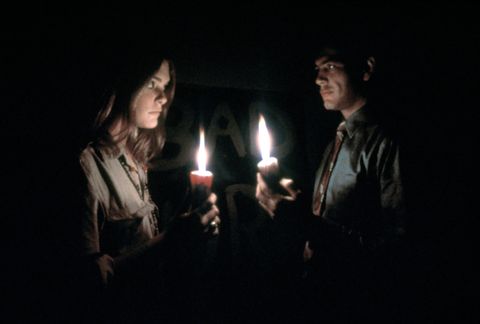Retrospective 2021
Breaks and Turning Points
Cinema can shake up thought structures and let worlds collide – personal and social, aesthetic and political, real and fictional. This makes cinematic experiences exciting and bewitching, but also unsettling and sometimes disturbing.
For 70 years, the IFFMH has been discovering talent, looking through their eyes and cameras at social developments and shifts, and understanding films as seismographs of their respective eras. On the occasion of the 70th edition, the retrospective ›Breaks and Turning Points‹ delves into the history of the festival. The aim is not to highlight a representative cross-section; here as well, the emphasis is on discovery and rediscovery — a fresh look at the range of international cinema that has been brought together at the festival.
In this sense, the retrospective is a journey across the focal points of the history of the festival and of cinema. The international auteur cinema of the so-called new waves is one of the threads that run through the decades. Last year's retrospective was devoted to French cinema in the wake of the May 1968 revolts, and now several works again focus on the formative events of the late 1960s: civil rights movements, student unrest, the Prague Spring.
Across the 14 programs that make up the retrospective, the filmmakers’ work speaks of turning points – at times of a sociopolitical nature, at others of an artistic nature. In doing so, they all break with the cinematographic conventions of their predecessors, each in their own way. Together, we experience their voices, brimming with a desire for departure and expression.
No other country produced more films during the 1950s than India – and yet, they were hardly noticed on an international level. This changed abruptly with Satyajit Ray's ›Pather Panchali‹ (1955). The film was celebrated the world over, including in Mannheim. The lyrical narrative style, strongly inspired by Italian neorealism, was not only influential for Indian cinema. And in the years that followed, many other countries also experienced new waves: France, most prominently and influentially, but also England, Iran and Czechoslovakia, among others.
In the USA, independent cinema formed around John Cassavetes, emerging as a precursor of New Hollywood. Haskell Wexler's ›Medium Cool‹ (1969), which won the Grand Prize of the City of Mannheim, climaxes with the riots of the Democratic National Convention and shows the USA in turmoil. At the same time, in Germany, Edgar Reitz, Adolf Winkelmann, Günter Peter Straschek, and Danièle Huillet and Jean-Marie Straub also sought new aesthetic means of addressing the sociopolitical upheavals of the FRG. The Oberhausen Manifesto heralds the New German Cinema. These are years marked by an overwhelming desire to experiment. The search was no longer for stars to place in front of the camera; the filmmakers realized that the camera itself had become the real star.
From there, there’s two decades left until the end of the Cold War and the end of the retrospective. 1989: the political upheaval in the countries of the Eastern Bloc is in full swing when Volker Koepp shoots a documentary in Zehdenick, Brandenburg, about the decline of the local brick factory. ›Märkische Ziegel‹ (1989) is imbued with an omnipresent disillusionment. With this specific regional perspective on the fall of the Berlin Wall, Koepp proves himself to be a great chronicler of a watershed moment in history.
Finally, Abbas Kiarostami's ›The Experience’‹ (›Tadjrebeh‹, 1973), about a boy from a poor background who falls in love with a girl from an upper class neighborhood, is reminiscent of Ray's narrative approach and political awareness. Echoes of both can also be found in Manuela Serra's ›O Movimento das Coisas‹. This documentary emphasizes the role of women filmmakers at historical breaking points. Ula Stöckl's ›Neun Leben hat die Katze‹ (1967) is also considered a classic of feminist cinema, as is Gertrud Pinkus' ›The Woman's Greatest Value Is Her Silence‹ (›Il valore della donna è il suo silenzio‹, 1980). With Věra Chytilová's ›Something Different‹ (›O něčem jiném‹), the program also includes a film by one of the most important female directors of European cinema. Her work: angry political cinema that fiercely rattles the patriarchal status quo and, like the other filmmakers in this retrospective, joins in the upheavals and departures of her time through the means of cinema.
The films of the 2021 Retrospective at a glance:
Pather Panchali - D: Satyajit Ray - IND 1955
La Jetée - D: Chris Marker - FRA 1962
Something Different - D: Vera Chytilová - CSK 1963
Diamonds of the Night - D: Jan Nemec - CSK 1964
Jimmy Orpheus - D: Roland Klick - DDR 1966
Mahlzeiten - D: Edgar Reitz - DEU 1967
The Cat Has Nine Lives - D: Ula Stöckl - DEU 1968
Medium Cool - D: Haskell Wexler - USA 1969
Salesman - D: Albert Maysles, David Maysles, Charlotte Zwerin - USA 1969
The Experience - D: Abbas Kiarostami - IRN 1973
A Child in the Crowd - D: Gérard Blain - FRA 1976
Escape Route to Marseilles - D: Ingemo Engström, Gerhard Theuring - DEU 1977
Il valore della donne è il suo silenzio - D: Gertrud Pinkus - CHE, DEU 1980
O Movimento das coisas - D: Manuela Serra - PRT 1985
Märkische Ziegel - D: Volker Koepp - DDR 1989
